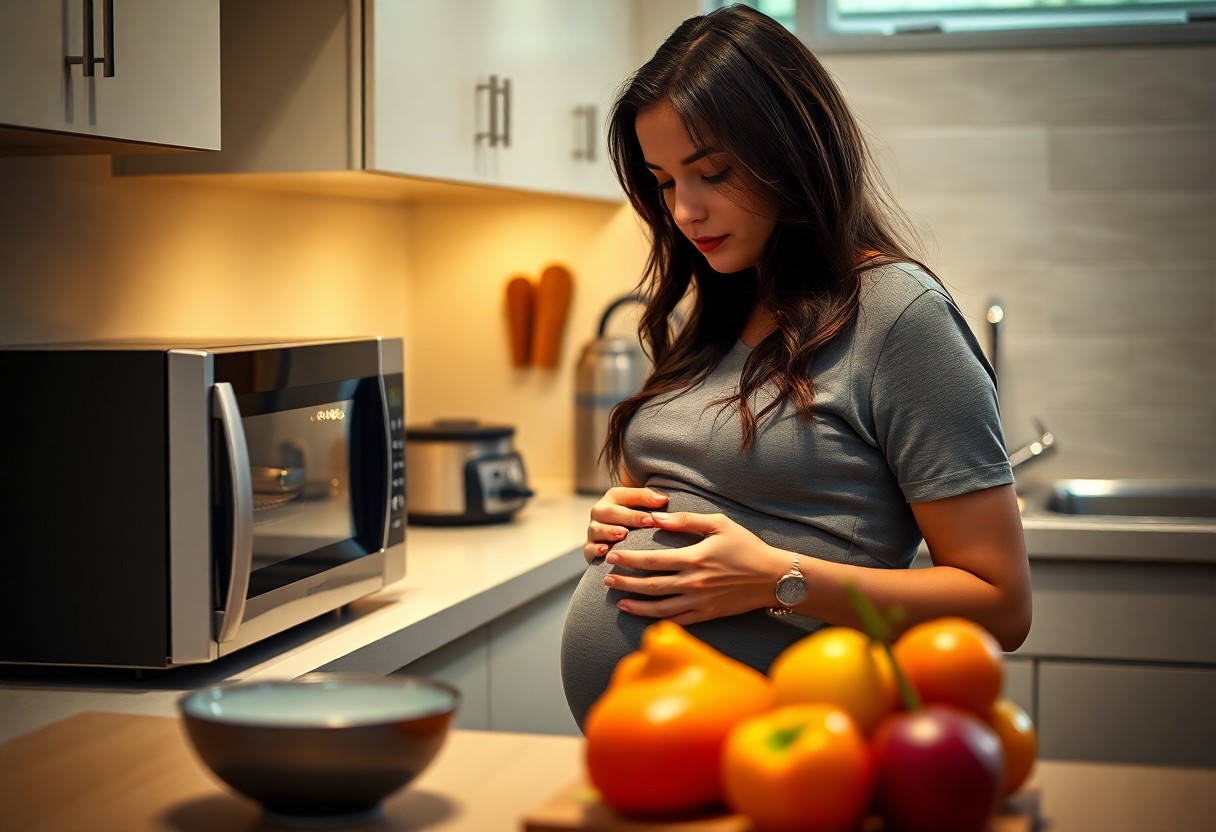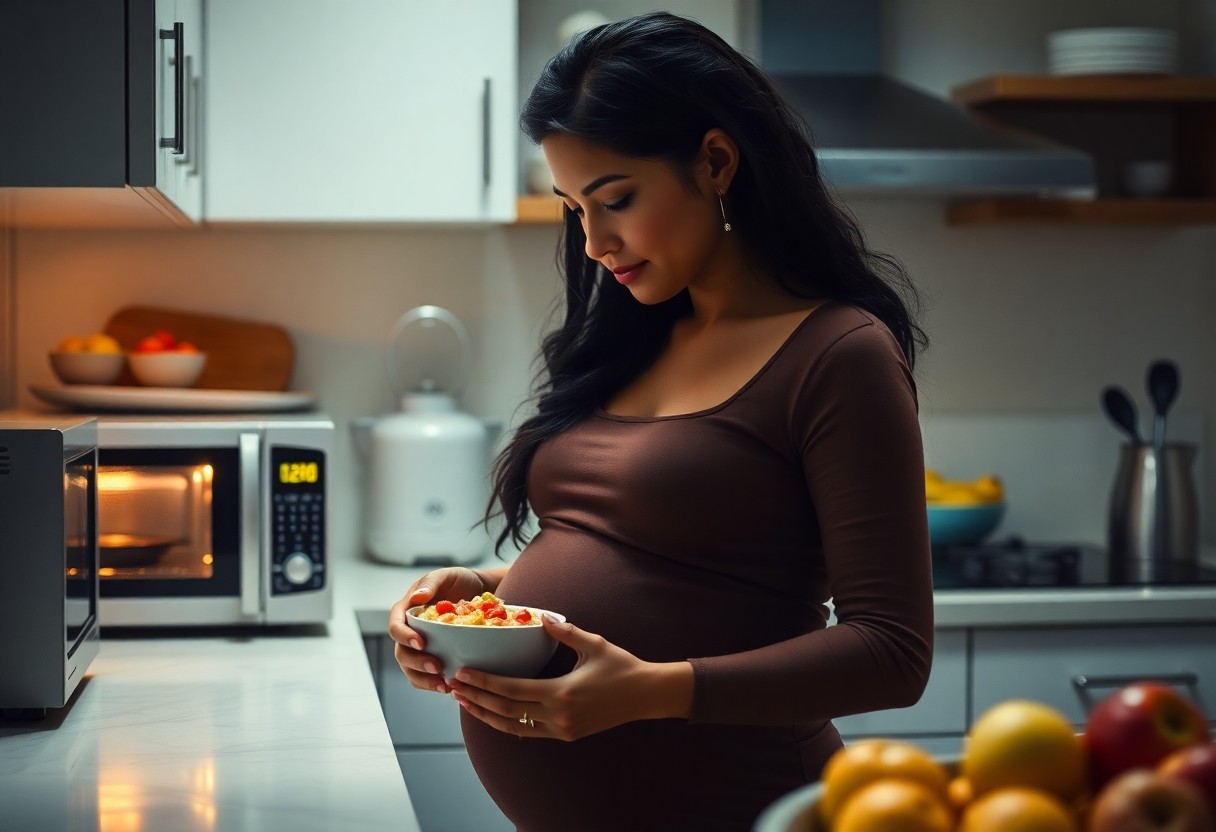There’s a lot to consider when it comes to your diet during pregnancy, and one common concern is whether you can safely eat microwaved food. While microwaving can be a convenient cooking method, it’s important to ensure that food is heated thoroughly to avoid potential harm from bacteria or uneven cooking. Certain foods may lose their nutritional value when microwaved, so choosing wisely is key to maintaining a balanced diet for you and your baby. In this post, we will explore the safety guidelines and considerations for microwaving food during your pregnancy.
Key Takeaways:
- Microwaved food is safe to eat during pregnancy as long as it is cooked thoroughly and evenly to avoid cold spots.
- Be cautious with certain foods that should not be reheated, such as deli meats and seafood, which may pose a risk of foodborne illness.
- Always ensure that leftovers are stored properly and consumed within safe timeframes for optimal health during pregnancy.
The Microwave Debate: Safety Concerns for Expectant Mothers
Pregnant women often worry about the safety of microwaving food, questioning if it poses any risks to their developing baby. Some fear exposure to microwave radiation, while others are concerned about nutrient loss during the heating process. Understanding the facts behind these concerns can help you make informed decisions and enjoy the conveniences of microwaving without anxiety.
The Truth About Microwave Radiation
Microwave ovens emit non-ionizing radiation, which is significantly different from ionizing radiation produced by X-rays or nuclear materials. The levels of radiation used in microwaves are considerably low, and they are designed to contain this radiation within the appliance. When used properly, microwaves are considered safe for you, even during pregnancy.
Nutrient Retention in Microwaved Foods
Microwaving is often quicker than traditional cooking methods, which can be beneficial for nutrient retention. Studies show that microwaved vegetables can retain more vitamins, particularly water-soluble vitamins like vitamin C and certain B vitamins, since shorter cooking times limit nutrient decomposition. However, the key is to use minimal water and avoid overcooking to maximize nutrient preservation.
In fact, research indicates that microwaving can preserve up to 90% of certain nutrients in vegetables, compared to boiling, which can result in a loss of up to 50%. This retention rate is ideal for ensuring you and your baby get the necessary nutrients for healthy development. Utilizing steaming bags or microwave-safe dishes can also enhance nutrient conservation while preparing meals quickly and efficiently.

Assessing the Risks: Bacteria and Food Safety
Microwaving food can pose certain risks, especially when it comes to bacteria that can lead to foodborne illnesses. During pregnancy, your immune system may be more susceptible to infections, making food safety paramount. Proper food handling, cooking, and storing are imperative to mitigate these risks. A failure to heat food adequately can result in harmful bacteria like Listeria or Salmonella surviving and multiplying, which can jeopardize both your health and that of your baby.
Common Risks Associated with Microwaved Foods
Microwaved foods may harbor bacteria if they are not heated evenly, leading to cold spots. Foods such as leftovers, pre-packaged meals, or those containing meat should be checked thoroughly. Additionally, covering food can trap steam, which helps to cook it evenly; however, consider the materials used, as certain plastics can release harmful chemicals when heated.
Guidelines for Proper Microwaving Techniques
To reduce any potential risks, always follow safe microwaving techniques. Begin by stirring and rotating food halfway through the heating process to ensure even cooking. Check the temperature with a food thermometer; the internal temperature should reach at least 165°F (74°C) for safety. Also, avoid using plastic containers not labeled as microwave-safe, as they might leach toxins into your food when heated.
Utilizing a microwave-safe container that allows steam to escape is vital for even cooking. Thoroughly cover your food while ensuring there’s a vent for steam. Cooking in small batches and allowing ample standing time after microwaving can further help reach consistent temperatures throughout the dish. It’s also beneficial to let food cool slightly before serving, as it can be extremely hot right out of the microwave, posing a burn hazard. Engaging in these practices will greatly enhance food safety during your pregnancy.

Nutritional Value: Microwaved Meals Under the Microscope
Microwaving meals can affect their nutritional value, but research indicates that the impact varies based on the food type and cooking method. Certain nutrients, particularly water-soluble vitamins like B and C, are sensitive to heat and can be diminished during cooking. However, microwaving often requires less cooking time, which can help preserve these imperative nutrients compared to longer cooking methods.
Comparing Microwaved versus Conventional Cooking
When assessing the nutritional differences between microwaved and conventionally cooked meals, consider the following:
| Cooking Method | Nutritional Impact |
|---|---|
| Microwaved | Preserves more nutrients due to shorter cooking time; ideal for steaming vegetables. |
| Conventional | Longer exposure to heat can lead to nutrient loss; boiling can sap vitamins into the water. |
Meal Preparations for Optimal Nutrition
Opting for the right meal preparation methods can significantly enhance your overall nutrition while ensuring safety during pregnancy. Choosing fresh ingredients and utilizing microwave-safe containers can lead to more nutrient-rich meals that are easy to prepare.
To optimize your meals, start by selecting whole foods like fresh vegetables, lean proteins, and whole grains. Use minimal water when microwaving vegetables to prevent nutrient loss, and consider steaming to retain flavor and texture. Avoid overcooking, as this can diminish values further. If you’re reheating, heat to the right temperature to kill potential bacteria, while also preserving nutrients. Paying attention to meal preparation methods can help you reap the benefits of your food, keeping you and your baby healthy.
Practical Tips for Expecting Mothers
For expecting mothers, microwaved food can be a convenient option but requires careful consideration. To stay on the safe side and ensure proper nutrition, focus on the following tips:
- Select meals with no artificial preservatives or high sodium levels.
- Opt for whole foods and options rich in vitamins and minerals.
- Use microwave-safe containers to avoid harmful chemicals.
- Avoid reheating leftovers more than once to limit bacterial growth.
Thou should also ensure your food reaches safe internal temperatures to maintain a healthy pregnancy.
Selecting Safe Microwavable Options
When choosing microwavable options, lean towards prepackaged meals that label themselves as natural or organic. Check the ingredients for any high-sugar or high-fat additives, and avoid products with artificial flavors and colors. Fresh or frozen veggies, lean proteins, and whole grains make excellent choices since they can be microwaved quickly while retaining most of their nutritional value. Always review expiration dates and choose brands you trust.
Must-know Microwaving Practices for Health
Practicing safe microwaving techniques is important for your health and your baby’s. Ensuring even cooking is paramount, as microwaves can heat food unevenly, leading to hot spots that can harbor bacteria. Stir or rotate food midway through cooking, and use a food thermometer to check its internal temperature, aiming for at least 165°F. Additionally, allowing meals to rest after microwaving for a few minutes will help distribute heat evenly and further minimize the risk of bacterial growth.
In-depth understanding of microwaving practices can significantly enhance the safety and quality of meals. Avoid using plastic containers that are not explicitly marked as microwave-safe, as some may leach harmful chemicals like BPA into your food. Opt instead for glass or ceramic options. Covering dishes with microwave-safe lids or vented wraps facilitates even heating and steam retention, enhancing meal flavor and texture. Keep in mind that some foods, like eggs or tomatoes, can create pressure as they cook, so pierce their outer layer to release steam and prevent splatters. Investing time in learning these practices enriches your nutritional choices during pregnancy.
Expert Insights: What Obstetricians Recommend
Obstetricians advocate for the safe consumption of microwaved food during pregnancy, emphasizing that it can be a practical and efficient cooking method. They underscore the significance of ensuring food is heated thoroughly, as even microwaves can leave cold spots that harbor bacteria. Regularly checking the temperature of your meals and stirring them mid-cooking can help achieve uniform heat distribution. Many obstetricians reassure patients that when prepared and heated correctly, microwaved meals are as safe and nutritious as any other cooking method.
Medical Perspectives on Microwave Use During Pregnancy
Healthcare professionals highlight that microwaves emit non-ionizing radiation, which does not pose a risk to your developing baby. Studies have shown that when used properly, microwaves effectively cook food, eliminating harmful bacteria. Obstetricians commonly recommend using microwave-safe containers and ensuring that plastic does not leach chemicals into food during heating. These medical insights support the idea that microwaving can be part of a healthy diet during pregnancy.
Common Myths Debunked by Healthcare Professionals
Many misconceptions surround microwaving food while pregnant, with some believing it alters the molecular structure of food, making it unhealthy. However, healthcare professionals clarify that microwaving does not change food’s nutritional value any more than conventional cooking methods. Additionally, concerns about radiation exposure from microwaves are largely unfounded; typical use presents minimal risk.
Debunking myths is crucial for pregnant individuals to make informed food choices. For instance, the fear that microwaving causes nutrient loss is not supported by evidence. In fact, certain studies indicate that microwaving can preserve more vitamins than traditional cooking methods, which often require longer cooking times. If you ensure food is heated uniformly and utilize microwave-safe products, you can enjoy the convenience of this cooking method without compromising your nutrition or safety.
Conclusion
Ultimately, you can safely eat microwaved food during your pregnancy as long as you ensure that the food is heated thoroughly and evenly. Microwaving can be an efficient way to prepare meals, but always check the temperature to avoid any potential risks. Focus on consuming a balanced diet that includes a variety of foods, and avoid processed items with high sugar or sodium content. By following food safety guidelines and making informed choices, you can enjoy your meals without unnecessary worry.
FAQ
Q: Is it safe to eat microwaved food while pregnant?
A: Yes, it is generally safe to eat microwaved food during pregnancy as long as the food is cooked thoroughly and heated evenly. Microwaving can effectively kill harmful bacteria if the food reaches the appropriate temperatures. Always ensure that leftovers are heated until they are steaming hot throughout to avoid any foodborne illnesses.
Q: Are there specific foods that should not be microwaved while pregnant?
A: Some foods should be approached with caution when microwaving during pregnancy. These include processed meats, unpasteurized dairy products, and any foods that may not heat evenly, like large cuts of meat. It’s best to avoid microwaving foods that are not labeled for microwave use, as they may not heat properly or could release harmful substances.
Q: How can I ensure my microwaved food is safe during pregnancy?
A: To ensure safety, always heat food evenly by stirring it during the microwaving process and using a food thermometer when applicable. Pregnant individuals should aim for an internal temperature of at least 165°F (74°C). Additionally, cover the food while microwaving to help it heat uniformly and avoid cold spots where bacteria can survive.
Q: Can I eat leftover microwaved food during pregnancy?
A: Yes, you can eat leftover microwaved food as long as it has been stored properly in the refrigerator and consumed within a safe timeframe, generally within 3-4 days. Always reheat leftovers thoroughly in the microwave, ensuring they are steaming hot all the way through to kill any bacteria that may have grown while stored.
Q: Is there any risk associated with microwaving plastic containers while pregnant?
A: Some plastic containers may release harmful chemicals when heated in the microwave, especially if they are not labeled as microwave-safe. To minimize any risks, use glass or microwave-safe plastic containers, and avoid microwaving plastic wrap and containers that are not designed for heating. Monitoring the types of materials in contact with food is important for safety during pregnancy.